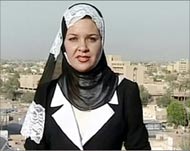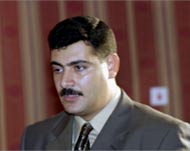Aljazeera’s Iraq journalists speak out
Journalists from Aljazeera Television’s Baghdad bureau – closed by the interim Iraqi government last month – regard their current presence in Doha, Qatar, as a forced break rather than a holiday.

Even then, they are worried that the hard work that went into making Aljazeera’s news-gathering operations in Iraq such a success, will go to waste if the Baghdad bureau remains closed.
Atwar Bahjat, Udai al-Katib and Abd al-Adhim Muhammad are Aljazeera reporters in Iraq – the visible face of a 103-strong team that constitutes the Baghdad office.
They have been in Doha since the Iraqi authorities, citing national security concerns, moved to close Aljazeera’s Baghdad office on 7 August for an initial period of one month
Aljazeera.net met with the three journalists and asked them about relations between Aljazeera staff in Baghdad and Iraqi government officials.
Tape stories
Muhammad said Aljazeera had no role in promoting what has been called a “false image” of the Iraqi people.
“We have been doing what any TV station would do if they were in our shoes. Every day, the Baghdad bureau’s information desk gets hundreds of press statements, letters and parcels from different sources.”
 |
|
Bahjat: Iraqi officials do not love |
“Sometimes among them we find a tape from groups working in Iraq. To us, these tapes are stories, and we deal with them as news stories, nothing more. I think any independent media organisation would do the same.”
On the other hand, Atwar Bahjat says that Iraqi officials are not necessarily in love with Aljazeera, but all the same they know they cannot afford to ignore the channel.
“Although there are some of them who do not talk to us and do not give us interviews, the majority of them deal with us, because they know what Aljazeera means in terms of how many people will listen to them speaking,” she said.
All three correspondents say Aljazeera is impartial and is not biased either towards or against the interim Iraqi government.
No clear answers
Muhammad said: “Iraqi officials want neutral coverage from their point of view. They blame us for not presenting the after-Saddam era achievements. But when we ask them what their achievements are, we do not get clear answers.”
He continued: “One day they invited us for the inauguration of a new school, but when we got there we found that it was not a new school but a renovated one. This is not a story from a journalistic point of view.”
Bahjat said Iraqi officials want Aljazeera to become somewhat of a government TV channel.
“Although most of the current Iraqi officials are former exiles and opponents of Saddam Hussein and have lived a considerable part of their lives in the West, they still cannot accept the truth when it is not in their favour,” she said.
 |
|
Udai: Maybe they stopped us in |
“Whenever I have asked them what achievements they would like us to highlight, I have wanted them to tell me about such achievements. For, if they newsworthy, then why not?
“But they consider restoration of public services that exist in every city in the world as newsworthy. I do not think the media should celebrate the performance of every piece of normal duty by a government official,” she said.
Bahjat adds that Iraqi officials who were opponents of Saddam Hussein should be grateful to Aljazeera because the channel had given them a platform to present themselves to both Iraqi and wider Arab audiences.
Falluja lessons
Udai al-Katib, who reported extensively on the fighting in Najaf, feels the Iraqi government may have learned from the Falluja experience and wants to avoid more embarrassment.
“Aljazeera was the only media channel which covered the conflict in Falluja last April, and the world remembers how US and Iraqi officials were annoyed by the fact that someone was getting out the news from Falluja,” he said.
“Maybe the government had plans to similarly end the Najaf crisis and so closed the Aljazeera office in Baghdad to prevent the channel from telling the story as it is and cover all points of view. I think the Aljazeera style displeases some parties,” al-Katib said.